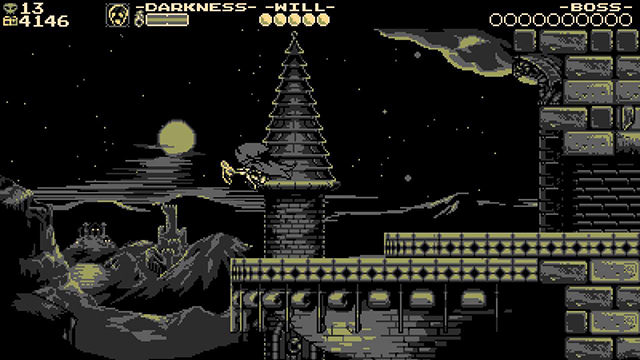Yacht Club Games has become so adept in its now nearly 3-year masterful wield of the 8-bit platformer genre that it almost becomes easy to take them for granted. Stylish visuals, cunning level design, hardy challenge, and of course bumpin’ chiptune earcandy have all become hallmarks of the Shovel Knight franchise in its short but fruitful life, and as such with Yacht Club there’s now an expectation. Thankfully, though dubious in a few minor areas, the series’ latest content injection Specter of Torment largely delivers. If you wanted more Shovel Knight, you’re getting what you wanted.
Blight the Earth
The premise for Specter is a bit more robust than the Plague Knight expansion before it, in that it holds weight and relevance to the original Shovel Knight’s narrative. Acting as a prequel, the game chronicles how the first title’s wicked Enchantress and her sinister Order of No Quarter came to be, and why so many baddies the world over willingly pledged to her pernicious, periwinkle ways. Essentially, Specter Knight traverses the world recruiting the bosses from Shovel Knight one by one, attempting to sway them to the cause. The results vary, ranging from affective nuggets of impressive writing to comical gags where things don’t quite go as planned. This series is carried by gameplay first and foremost, but those who felt the Plague of Shadows expansion lacked narrative heft will find Specter of Torment plenty satisfactory.
The main gameplay difference here is Specter himself. Though basic controls for running, jumping, and attacking remain the same, capabilities and feel are revamped and do take some getting used. Wielding a sickle rather than spade, Specter Knight controls almost like a Smash Bros. character or Bayonetta in 2D. Magnetically drawn toward enemies when attacking, he can strike, ricochet off foes, and repeat in a floaty, satisfying action-game style. To say it's worse or better than Shovel Knight’s moveset is not the point; the feel here differentiates itself and immediately settles any supposition that Shovel Knight releases are mere skins or body swaps. In that regard, the game excels where others often don’t.

Phantom Menace
Where I’m less unabashedly ecstatic is with Specter’s platforming arsenal. A main component of level traversal is physically attacking, utilizing enemies or environmental objects to fling yourself toward platforms or objectives in varying directions. This is first and often expressed via lanterns, red glowing (often moving or swinging) bundles that activate Specter Knight’s ability to dash through the air. The mechanic works, and it’s clear Yacht Club tweaked and tested it enough to ensure it doesn’t ever feel cheap or broken.
With that said, like many platformers taking traversal beyond running and jumping, it will feel cheap if you don’t understand how it works. Be warned that air-dash trajectory is determined not by the direction you press on the D-pad, but the location from which you attack relative to the lantern, object, or enemy in question. Keep that in mind and you should be able to convincingly blame yourself for death and not the game. And trust me, you will die a lot.
Regardless of whether your prefer Specter’s style to that of the series’ eponymous spade-wielder (the original stands tall for me), functional core mechanics parlay nicely into what has always been Yacht Club’s strength in the first place: daring, smart level design. Though primarily rehashes of Shovel Knight’s original locales, each stage is custom-fit for Specter’s capability, with new challenges, secrets, layouts, and clever head-scratchers despite similar environments and pacing.

It Feels Good to be Bad
The soundtrack also sees a refresh with detailed re-envisioning of familiar anthems, be it the bombast of “Strike the Earth!” (now made more regal) or the double-time feel that’s been playfully grafted onto the once backbeat-heavy tunes of the Lich Yard. Composer Jake Kaufman rarely missteps and that continues here, even if Specter’s serenades feel familiar and are in some ways more of the same.
I’d be remiss not to mention collectibles and powerups, as they go a long way in sprucing up the experience and operating in tandem with the stages themselves, with often quite sophisticated results. Powerups are purchased mainly from a cheeky red skeleton located in the Enchantress’s castle-hubworld, and you’ll need to pay him in red skulls rather than traditional Shovel Knight coin. Found scattered throughout each stage, red skull placement ranges from “easily grabbable” to just out of reach, dastardly temptation that will send you careening toward abyss and spike-pit time after time. Of course, this is a large part of what conjures the game’s overpowering sense of “just one more try,” without which Specter would not feel much like a Shovel Knight game anyway.
Conclusion
If you’re already a fan of Yacht Club’s charming 8-bit franchise, there’s little doubt you’ll want to pick up Specter of Torment. Its story angle alone as a prequel renders it unique, and encountering familiar characters and bosses from the perspective of a baddie is the sort of script-flipping that makes this universe worth perpetually hanging around in.
For my tastes, Specter himself features the least compelling of the three games’ platforming styles, but it’s not due to a mechanical or half-baked implementation: I just love the original Shovel Knight. As a timed Switch exclusive on a console with what is currently a modest number of games, there’s little reason not to play Specter of Torment unless you’re revisiting Shovel Knight proper via Treasure Trove first (which includes them all). My recommendation? Go for that. These games are worth it.
-
More 8-bit Shovel Knight glory
-
Stages and soundtrack have been refreshed for Specter specifically
-
New mechanics are technically solid
-
Compelling prequel narrative provides series backstory
-
Some may find Specter's platforming arsenal less compelling
-
Tried and true locales and music might be getting too familiar










